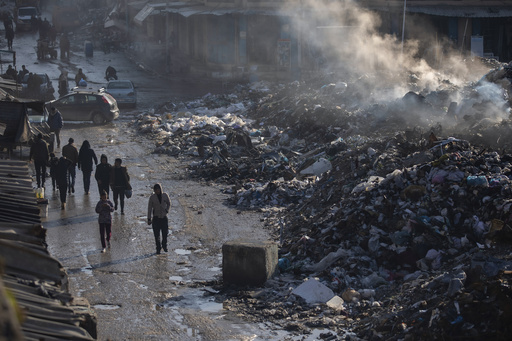
CAIRO — On Thursday, Hamas announced that it would proceed with the release of three Israeli hostages, which is expected to ease tensions surrounding the ongoing ceasefire in the Gaza Strip. The organization had previously indicated it might postpone the release due to allegations that Israel had not fulfilled its commitments, such as allowing humanitarian supplies and temporary shelters into Gaza, among other claimed violations of the truce agreement. In response, Israel, backed by U.S. President Donald Trump, had threatened to intensify military offensives if the hostages were not freed.
Though there has been no immediate response from Israeli officials concerning Hamas’ latest statement, this development could contribute to the maintenance of the ceasefire, albeit the overall future of the truce remains uncertain. According to Hamas, officials from the group discussed these issues with their Egyptian counterparts in Cairo, and were also in contact with Qatar’s prime minister regarding the entry of additional shelters, medical supplies, fuel, and heavy machinery for clearing rubble—demands that Hamas has emphasized in recent dialogues. The group asserted that mediators had committed to “remove all hurdles.”
Following this announcement, Hamas representative Abdul Latif al-Qanou confirmed via telephone that the planned release of the three hostages would take place on Saturday. Egyptian state television reported that Egyptian and Qatari diplomatic efforts have resolved the ongoing dispute, with both nations serving as fundamental mediators in the negotiations that led to the ceasefire, which has been in place since January after more than 15 months of conflict.
Media outlets in Egypt broadcast footage of trucks carrying temporary housing units and bulldozers positioned at the Rafah border crossing. Reports indicated that these vehicles were set to undergo inspections by Israeli authorities before proceeding into Gaza.
However, potential challenges lie ahead for the truce in the coming weeks. The current phase of the ceasefire is expected to conclude at the start of March, with no significant discussions yet concerning the next phase, which would see Hamas release a significant number of remaining hostages in exchange for an end to the conflict.
Trump’s controversial proposal to relocate around two million Palestinians from Gaza to other nations has cast additional uncertainty over the ceasefire’s stability. While Israeli officials have welcomed the plan, it has faced staunch rejection from Palestinians and Arab nations, many of which are unwilling to accept a large influx of refugees. Furthermore, human rights advocates have warned that this proposal could amount to a violation of international law.
Prime Minister Benjamin Netanyahu’s far-right coalition partners have already begun advocating for the resumption of hostilities post the first phase, with an eye toward facilitating Trump’s vision and eradicating Hamas, which remains a dominant authority in Gaza following one of the most devastating military campaigns in recent history.
The conflict ignited on October 7, 2023, when Hamas-led militants infiltrated Israel, resulting in the deaths of approximately 1,200 individuals—predominantly civilians—and the abduction of around 250 people. Of those taken, over half have been released through deals with Hamas or other agreements, and eight have been rescued, alongside dozens of bodies recovered.
The hostages remain among Hamas’ most significant bargaining chips, making further commitments to releases complicated if the group feels a resumption of hostilities is imminent.
Trump’s position on the situation in Gaza has been somewhat ambiguous. While he claims credit for initiating the ceasefire just before taking office—after extensive negotiations under the Biden administration—he has expressed reservations about the agreement’s progression, indicating that the decision to resume fighting lies with Israel, while affirming ongoing U.S. military support.
Currently, 73 hostages remain unaccounted for, with around half presumed deceased. Most remaining captives are male, including Israeli soldiers. The conflict has resulted in over 48,000 Palestinian casualties, primarily among women and children, according to Gaza’s Health Ministry, which does not specify how many were combatants. Israel’s military claims to have killed over 17,000 militants, although no substantial evidence has been provided to support this assertion.
Israel’s military operations have devastated vast areas of Gaza, with the conflict displacing about 90% of the territory’s 2.3 million inhabitants at its peak. While some families have begun returning home since the ceasefire, many have found only rubble, the remains of the deceased, and unexploded ordnance.
Israeli Defense Minister Israel Katz warned that “all hell will break loose” if Hamas ceases hostilities surrounding hostage releases, foreseeing a potential “new Gaza war” that could lead to Hamas’s ultimate defeat and enable the execution of Trump’s plans for mass displacement. With fewer hostages left in Gaza, Israel’s military would have greater latitude to operate, likely with less pressure from the United States, its principal military ally. The Biden administration has occasionally challenged Israel’s actions while also providing vital logistics and diplomatic backing.
Trump has relaxed restrictions on arms sales and is proceeding with a $7 billion weapons deal approved during Biden’s administration. He has suggested relocating Gaza’s population to neighboring regions, envisioning wealthy Arab nations financing this process. His idea includes a suggestion that once the conflict ceases, control of Gaza would be handed over to the U.S. to redevelop it as a luxurious vacation destination in the Middle East.
In a display of support for renewed military action, Israeli Finance Minister Bezalel Smotrich, a major player in Netanyahu’s fragile government, has voiced his endorsement of ongoing warfare, advocating for the “voluntary migration” of a large number of Palestinians from Gaza back to the re-establishment of Israeli settlements.

